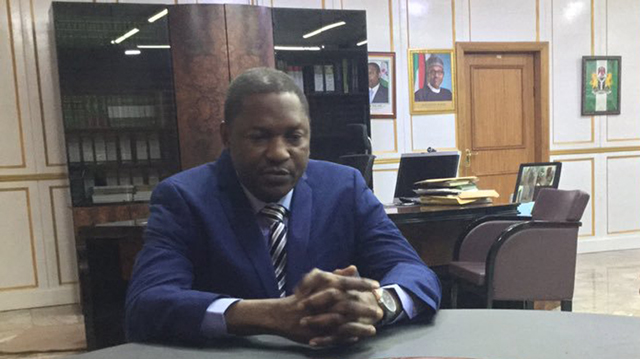
The Attorney-General of the Federation and Minister of Justice, Abubakar Malami SAN, says President Muhammadu Buhari’s renowned anti-corruption posture and policies, unsurprisingly, brought to the front burner issues of judicial reforms and independence.
Malami made the disclosure in Abuja, during the 17th Edition of President Muhammadu Buhari’s Administration’s Scorecard Series on Thursday.
He said that adherence to the tenets of the rule of law, deepening democratic governance practices and strengthening institutional reforms across law enforcement and anti-corruption agencies were part of the cardinal policies at the core of the agenda of Buhari’s administration.
“Justice sector transcends the Ministry of Justice or the Office of the Attorney General. The policies and activities in the justice sector are driven by different stakeholders who play assigned roles ranging from the enactment of laws, and interpretation of laws, to the implementation or enforcement of laws, with the ultimate aim of ensuring access to justice.
“The fact that justice is a mandatory requirement of an orderly society means that justice permeates every sector of society and governance’’.
He noted that an efficient justice delivery system is key to ensuring Nigeria’s economic growth and development, as well as ensuring the socio-economic well-being of citizens.
“Investors are often attracted to economies that have institutionalized functional judicial systems, and where the rule of law prevails.
The minister said that in recognition of the need to strategically address the challenges facing the sector, the ministry convened the first-ever National Summit on Justice.
He said the summit was aimed at building consensus among justice sector institutions and practitioners and evolving a justice system that is fairer, more effective, accessible, efficient and responsive to the hopes and aspirations of Nigerians.
“In a federation and constitutional democracy such as ours, the collaboration between the Federal and State governments and other stakeholders in the justice sector is critical to driving the reforms of the justice system for national development.
“The result of the summit was the adoption of a National Policy on Justice in 2017, which is a blueprint to guide all justice sector institutions, without compromising the fundamentals of our federal system of government’’.
He said the ministry has been strongly driving the prosecution of sexual and gender-based violence, anti-corruption drive, and increased transparency with the growth of initiatives like freedom of information, beneficial ownership disclosures and open contracting.
“There have been continued efforts to strengthen dedicated institutions to ensure data–policy nexus and inter-agency coordination and collaboration, especially via the Inter-Agency Task Team of anti-corruption agencies (IATT) platform’’.
He added that in line with the cardinal principle of the present administration in the fight against corruption, they have achieved the following successes under the Asset Recovery and Management effort of this Administration.
“In revenue generation through the sale of forfeited assets, the sum of one billion, eight hundred and twenty-three million, seven hundred & eighty-eight thousand, one hundred and forty-six thousand naira, eighty-six kobo has been generated so far by the Ministry, from the forfeited properties.
“In international asset recoveries
in compliance with Presidential mandates and foreign judicial processes, the Ministry has recovered the sum of six million, three hundred & twenty-four thousand, six hundred & twenty-seven pounds, sixty-six pence; five million, four hundred and ninety-four thousand, seven hundred and forty-three euros, seventy-one cents; and three hundred and ninety million dollars from various jurisdictions.
“Some of the recovered funds are being utilized in the financing of critical infrastructure including Abuja – Kano Expressway, Second Niger Bridge, and Lagos – Ibadan Expressway.
“Due to the concerted efforts by my office, in conjunction with relevant stakeholders, including the legislature, the president recently assented to the Proceeds of Crime (Recovery and Management) Act 2022 (POCA) on May 12 2022.
“POCA is the first legislation in Nigeria that comprehensively provides for mechanisms, processes and procedures for the tracing, restraint, seizure, confiscation, forfeiture and management of properties derived from unlawful activities.
“Its main objective is to take out the profits that incentivize and fund crime, with the ultimate aim of disrupting the cycle of crime and preventing future offences and corrupt practices’’.
He added that the ministry has also been able to enact the following anti-corruption and criminal justice laws:
Money Laundering Prevention and Prohibition Act, 2017, Nigeria Financial Intelligence Unit Act, 2018, Mutual Legal Assistance Act, 2018, Company and Allied Matters Act incorporating Beneficial Ownership, 2020, Terrorism Prevention and Prohibition Act, 2022, and Witness Protection and Management Act, 2022’’.
He concluded that the ministry has relentlessly been contributing its quota to the running of government and fulfilling the promises of delivering good governance based on the Rule of Law and sound Democratic values in accordance with best practice.






